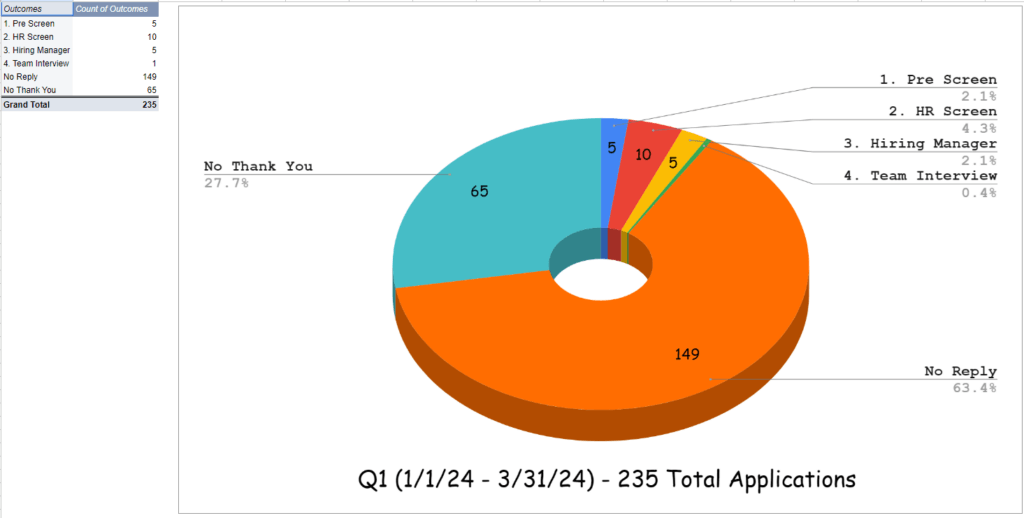Why Does Job Hunting in QA Feel So Difficult Right Now?
May 6, 2024
JB Bartkowiak has worked in QA for 20+ years, performing almost every type of Software Testing you could imagine. And he writes. He's currently #opentowork**
He's the administrator and editor at BuildingMoxie.com, while his personal site - portfolio and resume can be found @ WebContent-JB.com.
QA Job Hunting by the Numbers (at least for me)
So continuing my calculations, I come up with 21 total interactions with a Talent or HR person representing a company associated with one of my applications. Between January 1, 2024 and March 31, 2024. And not counting the rando reach outs or cold calls I received from 3rd- or 4th-party recruiters during that period. (I mean - why waste that time.) This resulted in a total of 6 interviews with a Hiring Manager (or some person) that had at least some say in whether or not to offer me a job.
To recap, those 21 interactions equal just short of 9% of my 235 applications submitted during that period. Exactly 2.6% of my applications, those 6 interviews - landed me, the way I see it, a real chance of getting hired. So even for me, with 20 years experience as a Software QA, I had around a 2.5% chance of getting a QA job in Q1 of 2024 - if I knew someone at the company I was applying to or not.
And in staring at those number, I had to ask myself - Why Does Job Hunting in QA Feel So Difficult Right Now?
Finding QA Jobs May Be Easy, But Getting QA Jobs Seems Hard
Shortly after sharing that above data in a LinkedIn post, QAJobs (a new QA Jobs board) reached out. QA Jobs wanted me to expand on my LinkedIn post. ( Please look at it before commenting on my calculations - it explains my methodology.)

You see, I was riffed like the recent many in QA / larger tech at the end 2023. Now 2024, I’ve been interviewing, I’d say, at a steady clip. But I just haven’t landed anything yet.
With that LinkedIn post, I really wasn’t trying to say anything; I wasn’t looking for sympathy. I was only doing what a good QA job hunter should do. I was using social tools to engage with my network, and honestly - I was simply trying to see if I could still do a Pivot Chart in Google Sheets. Ha! You know, dust off an an old skill.
Now, with that invitation to post here, I had a decision - two ways to go. Negative or Positive.
Is There Something to Say Here about the Larger QA Job Market?
I am frustrated. Am I bitter about being cut loose? You’re f’ing right. I wonder if I am worth a sh*t. Furthermore, I also can’t help but worry that the number of QA Jobs might be shrinking.
Yes, sure; I am worried about the QA Job market. Will it be able to sustain me until I retire? I’m worried if there is ageism now in the QA Job market. We’ve been okay so far, but I’m worried whether my wife and I will be able to afford our mortgage come July. I’m worried AI is taking over. I’m worried if I’ll ever work, let alone in QA, ever again. Negative.
QA Job Hunting in an Opportunity to Explore Oneself & Skill Up
Or Positive. Though I’m long past the euphoria of self-exploration you get early in job hunting, I’ve had a great good bit of time to skill up. It’s a chance to revisit many of the professional skills you may not be using day to day when you get locked into a specific job for a time.
Plus with all this downtime, at least I get to do one thing that brings me great joy in life. I get to Write … for you!
Quick Side Note: Across the few personality tests and/or self-assessments I have taken, Learning itself appears to be my primary motivator when comes to jobs. So learning that - that’s a win.
The Problem is Not with Job Boards, or ATS, But Maybe Instead with Some Operating in the Hiring Industrial Complex
During a feeler call, one supposedly experienced recruiter asked coldly and off-the-cuff, “20 years experience in QA - why haven’t you been hired yet?” She continued, “You’re asking for x? X seems a little low for a Senior QA? What’s the problem? What’s wrong with you?”
Gonna take the high road here and say only, I didn’t record that one on my spreadsheet above. And I’ll give her less than another hair of thought. I’m sorry, there is zero room for this kind of, idk, further dehumanization in the world of Talent Acquisition. But all the same. While the spirit and tone of her question was off, it was, at the same time - actually kinda a good question. Why haven’t I been hired yet? Something I’ve been asking myself regularly.
I probably could compose another article alone trying to enunciate all the possible reasons why I haven’t landed a job yet.
There is no question that Job Hunting & Job Placement is now big big big business. And I like to think that this recruiter above was the exception to the rule. The largest chunk of Talent people out there, most of the Talent people I have met, both company-dedicated and professional stand-alone, care about you and really do want to help you find a job.
Some just don’t understand exactly what we are up against and what we, as QA, do.
The QA Profession Has Evolved Greatly in the Last 20 Years
I remember when all we cared about was delivering a quality software product. Sure, that sometimes meant unexpectedly babysitting a pre-Dev Ops push - 1:30am on a Friday night/Saturday morning. But those were simpler times. We in QA - Tested Software. We opened the product we were looking at, ~~did stuff to try to break it (and okay sometimes we didn’t have to try that hard)~~, and made sure that the end user could use the software as was intended. You looked, and you found bugs. We documented what we did - both for our internal teams as well as for those in the larger organization.
Even 10 years ago, it felt like Selenium was the only game. Most teams had gone full Agile and because of that had embraced Test Automation fully. An isolated few knew Selenium very well, and I was only beginning to explore it.
Now is not 10 years ago. QA Job Descriptions are dotted with - Cypress, Playwright, XUnit, BUnit, TestNG, paid low-code options - Test Complete, containerization and Kubernetes, Jenkins, Circle CI, Sauce Labs, visual-driven testing, keyword-driven testing, y-driven testing, BDD, TDD, Azure, PostgreSQL, AWS Lambda, ISTQB and on and on and on. Software Testing & QA Tooling, right along with Cloud-based solutioning and Talent Acquisition, is now, well … big big big business. Even the open source bits.
There’s => Node.js, VS Code, and Java, and .Net, and Python, Ruby, Go, Typescript, and so on. I mean - have you ever heard the story about skinning a cat?
Why Does QA Job Hunting Feel So Hard?
Yeah, you get it. Well, you might have skinned every kind of cat, in every way possible … except using the exact technology or tool that a specific company has set down as their go forward commitment to doing things & you are out!
Why QAs Get Into QA
It feels ironic. QA Jobs have historically been seen as having a low barrier of entry. Most get into the field, one way or another, with no formal education around Testing. I mean - the last time I checked there remains no 4-year degree in Quality Engineering.
But what is often missed, there is probably no single job in a software organization that requires as many differing and varying skills as QA. (And perhaps that, in fact, is the draw for many of us.)
I had yet another recruiter ask me, “20 years? Why are you still in QA?”
Software organizations have unsung superstar resources in their QAs. As quoted right here from the QA Jobs site, “Despite all of its importance, the QA field often doesn’t get the recognition it deserves, leading to professional turnover (often the first to go in tough times). This turnover contributes to a scarcity of skilled QA talent.”
QAs are SMEs who understand Product, and UX - who know how to decode Business Requirements. They churn out Dev-level code for Test Automation projects, then turn around to explain to a stakeholder what an API is or how a Microservice works. QAs are investigative reporters, researchers. Technical Writers. (Shameless, self-promotional plug there.) QAs need to know Process - the principles and required rhythm of Agile. They need to know DevOps - how to moves files and resources around & how to configure systems. QAs need to know how to troubleshoot - they use the same skills used in Support, Pre-Sales / Implementation, Business Development. They need to be able to manipulate, organize and analyze data (remember back to the top of this post). They need to know how to communicate, both verbally and through writing. We must be masters at negotiating and persuading on behalf of Quality.
It’s Hard to Find a QA Job In 2024 Because of all the Competition Currently in the QA Field
There is no question it’s tough out there at the moment. Yet another recent interviewer told me, “You are 1 out of 1000 that applied for this role.” (No, I didn’t get an offer.)
Now, come close.
The secret to getting a QA Job in 2024 is rising above this competition. Doing your homework, about the company and your interviewer(s). Studying up on the specific tech they are seeking, and setting yourself apart. Maybe post a sample Automation project to github or write a blog post.
The secret to getting a QA Job in 2024 is being the 100% perfect fit.
I know this because, well, I know this. Unfortunately, it’s not because I was actually given any usable feedback on any of those 235 applications I submitted. Sadly. But we’ll save that for another time.
